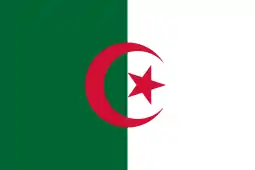Chaabi (Algeria)
Chaabi is a traditional music of Algiers (Algeria), formalized by El Hadj M'Hamed El Anka.
| Part of a series on the |
| Culture of Algeria |
|---|
 |
| People |
| Art |
Originally from the Casbah, the music known as chaabi belongs to a tradition of recent origin. It emerged during the 1930s, and has lost none of its power of attraction up to the present time.[1] Inspired by vocal traditions of Andalusi music, such as muwashshah, using its modes and rhythm. Chaabi means 'of the people', and it's very definitely the people's music, even in a country where Raï rules.[2]
A typical song features mournful, Arabic/Berber vocals, set against an orchestral backdrop of a dozen musicians, with violins and mandolins swelling and falling to a piano melody and the clap of percussion beats. Chaabi is part of a deeply conservative tradition and its lyrics often carrying a strong moral message.
At first Chaabi remained a scandalous genre, thriving behind closed doors or in specific locations called "Mahchachat" (cannabis dens),[3] where the admirer of this music would go to drink coffee, tea or smoke. By the late 1950s, however, it had become the people's music, played at weddings and religious festivals. Its main exponents included Oran based singer Lili Labassi, El Hadj M'Hamed El Anka, the father of Chaabi, and Dahmane El Harrachi, composer of the classic tale of emigration Ya Rayah.[4]
In 2011, Safinez Bousbia directed a documentary on chaabi music. It took over seven years to make, facilitate and track the reunion of the Jewish and Muslim members of a chaabi group from colonial Algiers known as El Gusto.[5]
Bibliography
- Ahmed Hachlaf, Anthologie de la musique arabe, 1906-1960, Publisud ISBN 2-86600-426-4
References
- International Musicological Society. Congress (1993). Actas del XV Congreso de la Sociedad Internacional de Musicología: culturas musicales de Mediterraneo y sus ramificaciónes, Madrid/3-10/IV/1992. La Sociedad. p. 1242.
- Simon Broughton; Mark Ellingham; Jon Lusk (2006). The Rough Guide to World Music: Africa & Middle East. Rough Guides. p. 7. ISBN 978-1-84353-551-5.
- Magrini, Tullia (2003-06-15). Music and Gender. ISBN 9780226501666. Retrieved 2013-09-13.
- David Horn; Dave Laing (18 April 2005). Continuum Encyclopedia of Popular Music of the World Part 2 Locations (5 Vol Set): Volumes III to VII. Bloomsbury Academic. p. 65. ISBN 978-0-8264-7436-0.
- Patrick Crowley (17 July 2017). Algeria: Nation, Culture and Transnationalism, 1988-2013. Oxford University Press. p. 75. ISBN 978-1-78694-021-6.